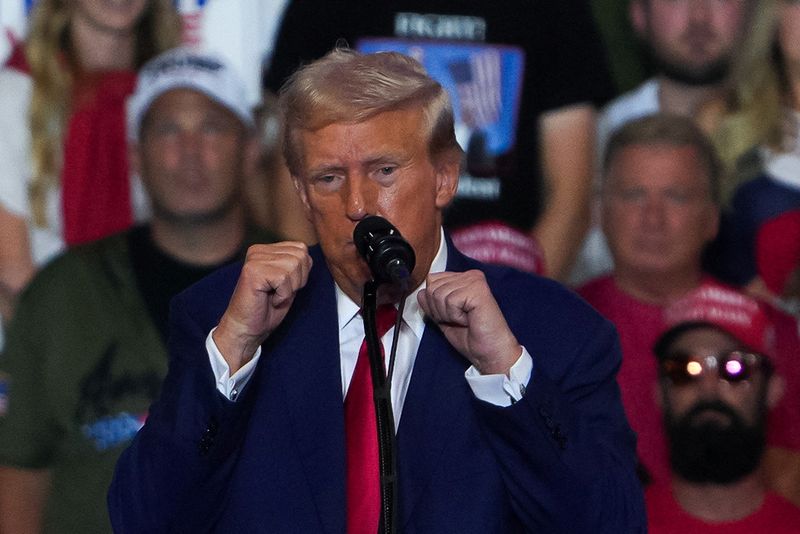By Gram Slattery and David Shepardson
YORK, Pennsylvania (Reuters) - Republican presidential candidate Donald Trump pledged on Monday to rescind a Biden administration rule limiting power plant pollution and reiterated a promise to block Nippon Steel's planned purchase of U.S. Steel.
In the most detailed economic remarks he has offered on the campaign trail so far, Trump also ratcheted up his pledge to radically limit foreign access to domestic markets, saying he would ensure the supply chain for essential goods would be 100% American if he wins the Nov. 5 election.
He did not elaborate on how he would accomplish that goal beyond advocating broad measures, like imposing tariffs on other nations.
The former president spoke to a crowd of supporters on a factory floor in the working-class city of York, Pennsylvania. The speech was the first stop in a tour of battleground states this week aimed at steering the spotlight away from the Democratic National Convention in Chicago and slowing the momentum of his rival, Vice President Kamala Harris.
Some allies and advisers have pressed Trump to steer clear of personal attacks on Harris - particularly any broadsides related to race and gender - and instead focus on policy issues.
He largely followed that advice on Monday. While Trump called Harris a "communist" and denigrated her policy stances, several of which he misrepresented, he attacked her in personal terms just once, when he insulted her laugh about 45 minutes into the hour-long speech.
Trump in February had signaled he would move to block the Nippon-U.S. Steel deal, a potential merger that has stirred anxiety among some unionized workers, a key voting bloc in Pennsylvania and the other "Rust Belt" swing states likely to determine the results of the election.
"I will stop Japan from buying United States Steel," Trump said. "They shouldn't be allowed to buy it."
U.S. Steel said in a statement after Trump's remarks that it is "committed to the transaction with Nippon Steel, which is the best deal for our employees, shareholders, communities, and customers."
The company added the "partnership with Nippon Steel, a long-standing investor in the United States from our close ally Japan, will strengthen the American steel industry, American jobs, and American supply chains, and enhance the U.S. steel industry's competitiveness and resilience against China."
Shares in U.S. Steel had been trending lower and fell after Trump's planned remarks were reported, closing down about 6%. President Joe Biden in March said it is vital for U.S. Steel "to remain an American steel company that is domestically owned and operated."
Trump also pledged to eliminate rules published by the Environmental Protection Agency in April, which limit air and water pollution from power plants and are designed to cut over 1 billion metric tons of greenhouse gas emissions by 2047. The electricity sector is responsible for nearly a quarter of U.S. greenhouse gas pollution, according to the EPA.
"It's a disaster for our country," Trump said. "Instead of shutting down power plants, we will open dozens and dozens more, and they'll happen fast."
Trump said his administration would bring more "advanced small, modular nuclear reactors" online and that he would invoke the Defense Production Act to ramp up production of essential products.
Even as he pledged broad tax cuts for families, businesses, Social Security disbursements and tips, he said he would slash the deficit, a claim that good government experts have cast doubt on.
In a brief interview with Reuters following the event, Trump said he would consider rescinding a $7,500 tax credit for electric vehicle purchases. He also said he would bring Elon Musk into his administration if the billionaire was willing. Musk, the CEO of EV manufacturer Tesla (NASDAQ:TSLA) and a vocal Trump backer, would stand to lose business if the tax credit were rescinded.

Pennsylvania has emerged as one of the most important states in the presidential election, with Harris and Trump effectively neck-and-neck, according to most opinion polls.
In a sign of the state's importance, Trump campaigned in the northeastern part of the state over the weekend, while Harris barnstormed the western part. On Monday, Trump's running mate, Senator JD Vance, addressed supporters in Philadelphia.